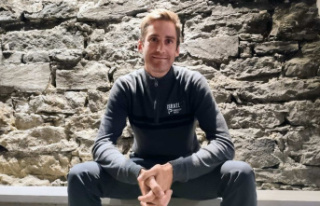Faced with the explosion of COVID-19 in China, some countries are starting to test aircraft wastewater from the Asian giant. The measure will not prevent the spread of the virus, but it allows in particular to identify possible new variants.
• Read also: Omar Sy responds to the controversy over his comments regarding the war in Ukraine
• Read also: COVID tests on travelers from China: Iata denounces “ineffective” measures
What is it about ?
This is to examine the mixed urine and feces of all passengers who went to the toilet during a flight from China. The goal is to detect the presence or not of the coronavirus there, in order to give an idea of its degree of circulation and the variants concerned.
To do this, directly when planes land, local authorities collect samples of their wastewater. They are then sent to laboratories where they are thoroughly examined for the virus. Once identified, its genome is “sequenced” to link it to a known or unknown variant.
Another possibility is to collect wastewater discharged from an entire airport. But this does not make it possible to measure the risks linked to a given origin.
Who did it ?
Several countries have already decided to test aircraft wastewater from China: Australia, Belgium, Canada...
The United States is considering doing so, according to US media, and the European Union (EU) is likely to recommend it to all of its member states, after positive advice from health experts this week.
To do what ?
The sewage review allows states to act as COVID cases soar in China after the lifting of drastic restrictions held for three years.
But this is in no way to hope to limit the spread of the virus across borders, unlike imposing negative tests on travelers.
"On the other hand, these samples represent a window on what is currently happening in China", explains to AFP the epidemiologist Antoine Flahault, in particular in a context of "doubts on the transparency and the diligence of the official health information of the Chinese government”.
The information is of two kinds. First, wastewater gives an idea of the degree of circulation of the virus: the more it is present, the higher the epidemic appears. "Knowing that 30% to 50% of passengers from China are currently infected is useful information in the absence of reliable figures on the incidence of COVID-19 in China currently", underlines Mr. Flahault.
Then, we can detect in this wastewater the possible presence of new variants, likely to change the face of the epidemic, as the arrival of the highly contagious Omicron did at the end of 2021.
What interest ?
Examination of sewage is much less burdensome for passengers and easier to conduct from a logistical point of view than, for example, testing each person individually.
This is why the measure is favored by the air transport sector. The lobby of European airports, ACI Europe, thus pleaded this week to be satisfied with examining their waste water, instead of imposing tests on passengers.
Examination of wastewater is a tool that “works remarkably well”, but it does not give an “exhaustive view” of the presence of the virus on board an aircraft or the variants circulating there, warns AFP virologist Vincent Maréchal.
There is indeed an obvious bias: this method only testifies to the presence of the virus in passengers who have gone to the toilet.
But, above all, the examination of wastewater may be interesting to better understand the degree of circulation of the virus, it gives little leverage to carry out concrete and rapid actions.
In question, the time required: it takes several days to complete the collection of water, their transfer to the laboratory and then their examination.
“Once we have the info, what do we do with it? Do we call back all the people (who were) on the plane?” asks Mr. Maréchal. "It's interesting, but already late for the measures we can take."













